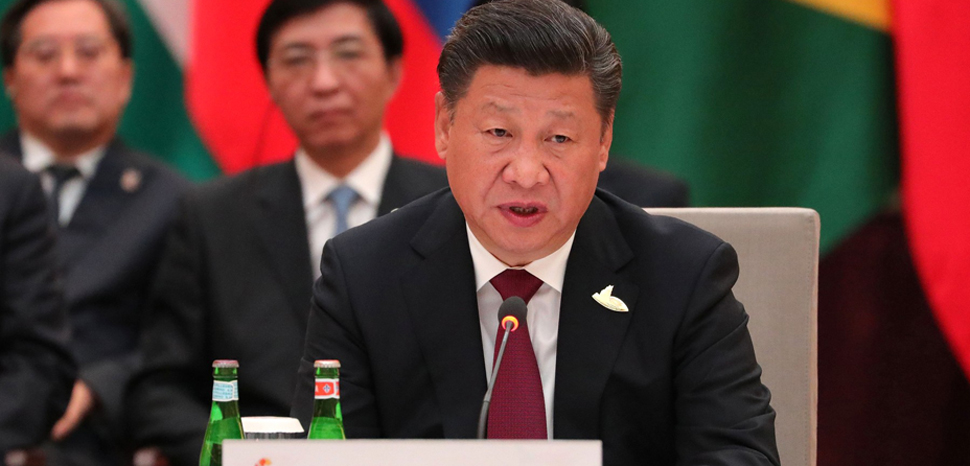As Mao Zedong saw his control over the Communist Party challenged, he unleashed the Cultural Revolution. The Great Leap Forward and other failed economic policies were of little importance. Only his continued leadership of the Chinese Communist Party and the survival of the Party as the sole source of power and thought was what Mao considered to be the essence of Chinese society. The Communist Party was the brain and the soul of the people; the state was the muscle.
Watching the violence of the swarming teenagers was the thirteen-year-old Xi Jinping. Today, Xi is applying the lessons learned during the Cultural Revolution between 1966 and 1976 to a society known only in the imaginations of George Orwell in 1984 and Aldous Huxley in Brave New World.
XI Jinping has spent forty years working his way from obscurity to the chairmanship of the Chinese Communist Party. What he learned from the past was that the CCP would have to maintain its hold on society in an inflexible ideological vice. That idea is now taking the form of the Social Credit program, which was introduced in 2013 and is to be fully implemented by 2020. Not only is the system intended to hold people in a technical trap, it is also designed to have those who subscribe unquestioningly to the program embrace their prison. Some 1.4 billion people of China are thus advised to pursue their wealth and enjoy their prosperity while ignoring that they are the silent servants of the God Emperor, Xi Jinping.
Xi did not have to invent the means to control the masses. There was a model already designed and tested in the West in the form of Equifax and the other credit rating firms. The Western credit rating forces everyone to comply with standards of financial behavior. Failure to meet these standards can block someone from acquiring a credit card or a loan that will allow for the purchase a car or a house.
Xi Jinping is taking it one vital step further. The person being rated must also fit social standards that apply more directly to political stability. Every aspect of one’s conduct is measured through the flow of data from private and official sources. If one has associates who are not approved by the authorities, their character is applied to everyone connected to the group. Spend too much time playing computer games or out at the local bar and the rating drops. Fail to fulfill one’s obligations at the company or government agency and ratings are slashed.
Failures require punishment to correct undesirable behavior. Access to airline or railway seats can be denied. The higher ranked hotels or restaurants may not want a deadbeat. In the end, it could even cost one a job or deny their children access to a high-ranked school. Maintain a high score and it could enable two high scorers on select web dating sites to find happiness forever more.
What Xi is creating is a society of rigid structures, and he’s extending the system beyond previous frontiers. Chinese students abroad are being forced to join Communist Party cells at their universities, where they are subjected to continued indoctrination and policing. Chinese companies outside of the country must follow Party guidelines, and that is also true for foreign businesses operating in China. Businesses that ignore the Party dictates could find regulations more harshly enforced and access to vital resources blocked.
Everything describes a leader obsessed with order. The Shanghai Cooperation Organization, the Asian Infrastructure Development Bank, and the revived Silk Road that intend to tie China to countries near and far are all based upon similarly rigid structures. Whether at home or abroad, Chinese cannot forget that Xi is the leader of the party, the party is the ruler of China, and China will dominate the world with the ancient civilization returning to its former prominence as the Middle Kingdom.
Fulfilling Xi Jinping’s dream of a restored China does depend upon maintaining discipline among one billion and four hundred million diverse people. In 2005, there had been concern within the Party ranks about the spread of corruption in a growing sea of riches and the breakdown of central authority. The Party needed an organization man and Xi was the one chosen.
The imposition of the imprisoning net cannot be managed without the cooperation of businesses that collect data on everyone. Furthermore, a critical mechanism for the control is the establishment of a cashless society, a process that is well underway. Five hundred million people are already using their mobile devices to make payments amounting to an estimated ten trillion dollars per annum.
All of the financial activities of the clients of Tencent or Alibaba are available to the government as a part of the social credit system. As these financial giants expand offshore they are creating a conduit into the lives of millions of foreigners. The millions of Chinese living outside of China will find that they are still linked to home through their wallets. Beijing can use that leverage over offshore citizens to promote Chinese interests.
A less subtle extension of power over the people comes in the form of re-education centers that the government calls ‘vocational training centers.’ The UN is reporting that a million Uighurs in mainly Xinjiang Province have been imprisoned for intensive re-education. The U.S. State Department’s 2016 International Religious Freedom Report estimates that there are 650 million Chinese religious believers, which means about half of the population. The Chinese Communist Party has ninety million members who are prohibited from joining any religious group. The Party holds that a citizen cannot be loyal to two masters, and only the Party will lead the nation. There has been an intensification of government attacks on religious institutions.
All of this expansion of control is a sign that the Party is frightened about the possibility that other centers of power will rise in the country. Selecting Xi Jinping as the autocratic ruler is a sign that the Communist Party of China is afraid of the Chinese people.
The opinions, beliefs, and viewpoints expressed by the authors are theirs alone and don’t reflect the official position of Geopoliticalmonitor.com or any other institution.




